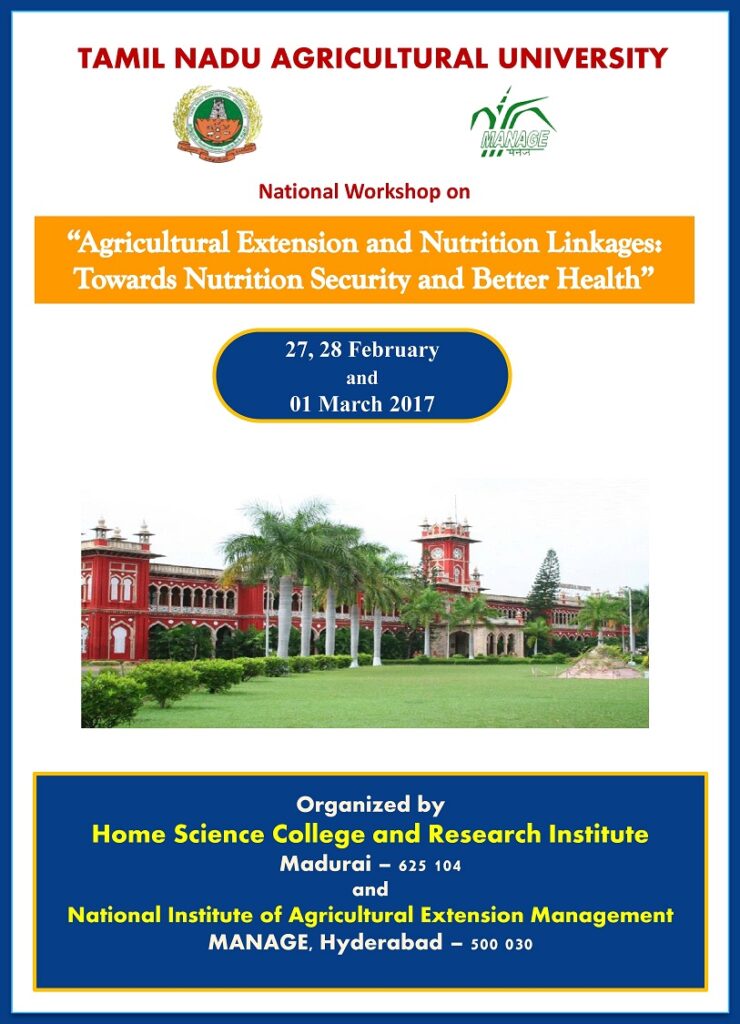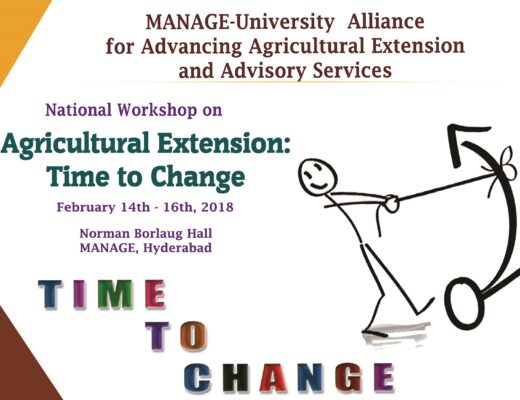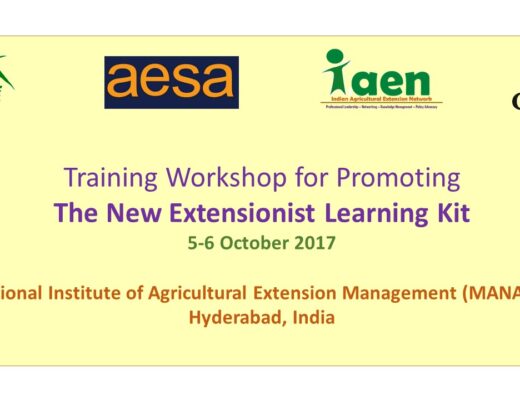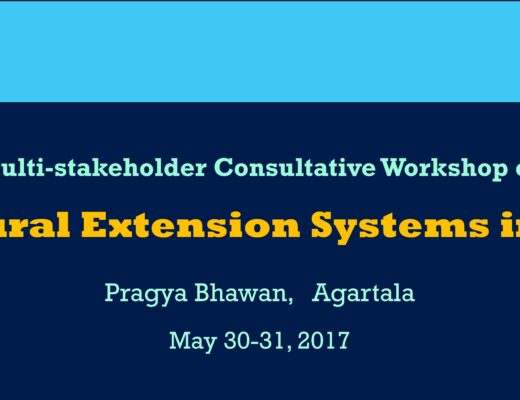| Agricultural Extension and Nutrition Linkages:
Towards Nutrition Security and Better Health
The agricultural production and implementation of appropriate agricultural extension services are key components for assuring food and nutrition security. For reaching out to the community, strengthening the linkages between agriculture extension and nutrition is important to achieve food and nutrition security. Agriculture-nutrition linkage through effective technology dissemination and adoption is an emerging area for policy framing and implementation in developing countries like India.
The main draw on agriculture, promotion of extension activities, food and nutrition are such that they are closely inter-related since agriculture production assures food security through transfer of technology. Post-harvest storage, processing and distribution systems and community nutrition are the fundamental areas which decide the policy frame work of the country in terms of food and nutrition security.
Also, important in this context are the three key entry points for agriculture-nutrition linkages which include agriculture growth, stability of food prices and empowerment of women in agriculture which can be achieved expansion of agricultural services. Inclusive growth in agriculture helps in strengthening the linkages between agriculture and nutrition. This can be achieved providing skill development and need based training in better processing and value addition technologies of locale specific farmers produces.
The shifting of consumption patterns toward non-cereals presents a good opportunity for small farmers to diversify their cropping patterns in order to improve both income and nutrition. Thus, diet diversification needs to be achieved, particularly in states with high rates of under nutrition. In this context, the increase in the production of non-cereal crops like millets will help to tide over shortage of rainfall as these crops are drought tolerant. There is also an increasing demand for millets at large, on account of its nutritional and health benefits.
The current focus should also highlight the importance of pulses as they are the primary source of protein for the poor and the vegetarians who constitute the majority of Indian population. Hence there is an imperative need to make available healthy processed foods in the market, for which pulses can be exploited to provide good quality protein, micronutrients and dietary fibre.
Also, priority should be placed on exploitation of underutilized foods as they are neither cultivated in an organized farming system nor processed established commercial processing methods. Most of the underutilized foods of the tropics are often available only in the local markets and are practically unknown in other areas. A large number of these foods are also known for their therapeutic and nutritive value and can satisfy the demands of the health-conscious consumers.
Post-harvest loss of these foods is a serious problem in developing countries. The total losses from harvest to the consumer point are as high as 30-40%, which is worth thousands of crores rupees. Value addition is thus an integral component of strategies to reduce post- harvest losses of foods belonging to the different food groups.
Also, dietary diversification bio-fortification and food fortification has to be promoted to bring the focus on nutritious crops. Market information also needs to be stressed for price stabilization, avenues for income generation, employment opportunities which helps for providing food and nutrition securities. Also food safety issues are of concern in the present scenario of demand for organic foods and processed convenience foods.
In this context, appropriate extension activities like community education programs for ensuring food security, food safety and household nutrition security have to be promoted for establishing effective linkages across agriculture, food and nutrition in achieving food and nutrition security for all.
|
|
Rationale: Good nutrition is the key to ensuring good health and well-being of populations. However, the present scenario is such that millions lack access to nutritious foods which negatively impacts the health of women and children. Malnutrition is the underlying cause of 45% of child deaths worldwide and iron and calcium deficiency have been identified as key contributors to maternal deaths, putting mothers at increased risk of anemia and pre-eclampsia. Cross-sectoral planning between the health and agricultural sectors can promote maximum impact of agricultural policies on health and vice versa. It is thus imperative to underline the importance of interlinking agricultural production, agricultural extension, food and nutrition to promote the general well being of the nation.
This can be achieved putting in place the components of agriculture and post harvest systems focusing on reducing food losses improved methods of storage, processing, preservation, food safety assurance, establishing the linkages with the food industry and other stake holders. The focus should be towards production of nutritious health foods to promote good nutrition and health among all age groups particularly the vulnerable groups. Also stress needs to be placed on increasing the consumption of whole grains, fruits and vegetables and processing to alleviate micronutrient deficiencies through promotion of Knowledge Attitude and Practices (KAPs).
Adding value to foods helps the farmer not only to overcome food spoilage and losses, but also fetches high returns due to the newly added technology. It thus provides convenience and safe food to consumers and promotes diversification and commercialization of agriculture providing linkages between consumers and farmers promotion of effective agricultural extension activities.
|
|
Workshop Goal
Enhancement of capabilities through agricultural extension services to achieve of nutrition security and better health.
|
|
Workshop Objectives:
(i) To create understanding on the inter-relationship between agriculture, agricultural extension and nutrition security.
(ii) To address issues pertaining to nutritional problems at the national and global level.
(iii) Promotion of knowledge on the importance of food processing techniques.
(iv) Intervention strategies to overcome nutritional problems.
|
|
|
Methodology
– The program will be arranged to impart technical and practical knowledge way of guest lectures, group discussion, field visits and case studies.
– Experiential learning will also be an essential tool of the delivery module demonstration, hands on training, industrial visits etc.,
– Group interaction will be encouraged and each participant will be given the opportunity to share his/her expertise in their area of specialization. Interaction with industry personnel, trainers etc.,
– Pre and post knowledge tests will be conducted to study the impact of the training program.
|
|
Participants
From Agricultural College and Research Institutes, Home Science College and Research Institute, Research Stations and Krishi Vigyan Kendras (KVKs) of SAUs, Agriculture and allied departments of State Governments
|
|
Expected outcome:
The participants will have the relevant knowledge to address and solve locale specific problems which hamper food and nutrition security through effective agricultural extension services. The program will also facilitate the relevant knowledge to identify and mitigate nutritional problems arising out of poverty and ignorance. This training will further help in empowering the participants to address issues related to the dual burden of malnutrition, which necessitates addressing micronutrient malnutrition on one hand and over nutrition on the other.
|
Program Directors
Dr. Saravanan Raj
Director (Agricultural Extension)
National Institute of Agricultural Extension Management (MANAGE)
Rajendranagar, Hyderabad – 500 030.
saravanan.raj@manage.gov.in/ saravananraj@hotmail.com
Dr. S. Parvathi Dean
Home Science College and Research Institute, TNAU
Madurai- 625 104, Tamil Nadu
deanhscmdu@tnau.ac.in |
Course Director & Communication address
Dr. G. Hemalatha
Professor (FSN)
Department of Food Science and Nutrition
Home Science College and Research Institute
Madurai- 625 104, Tamil Nadu |
Assistant Course Directors
Dr. S. Janaki Rani
Assistant Professor (Agril. Extension)
Department of Human Development
Home Science College and Research Institute
Madurai- 625 104, Tamil Nadu Dr. S. Jesupriya Poornakala
Assistant Professor (FSN)
Department of Human Development
Home Science College and Research Institute
Madurai- 625 104, Tamil Nadu |



